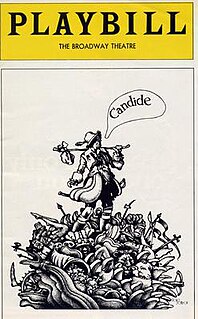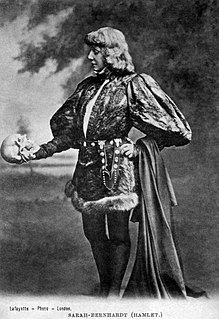Related Research Articles

The Tragedy of Hamlet, Prince of Denmark, often shortened to Hamlet, is a tragedy written by William Shakespeare sometime between 1599 and 1601. It is Shakespeare's longest play, with 29,551 words. Set in Denmark, the play depicts Prince Hamlet and his revenge against his uncle, Claudius, who has murdered Hamlet's father in order to seize his throne and marry Hamlet's mother.

Improvisational theatre, often called improvisation or improv, is the form of theatre, often comedy, in which most or all of what is performed is unplanned or unscripted: created spontaneously by the performers. In its purest form, the dialogue, action, story, and characters are created collaboratively by the players as the improvisation unfolds in present time, without use of an already prepared, written script.

John Barrymore was an American actor on stage, screen and radio. A member of the Drew and Barrymore theatrical families, he initially tried to avoid the stage, and briefly attempted a career as an artist, but appeared on stage together with his father Maurice in 1900, and then his sister Ethel the following year. He began his career in 1903 and first gained attention as a stage actor in light comedy, then high drama, culminating in productions of Justice (1916), Richard III (1920) and Hamlet (1922); his portrayal of Hamlet led to him being called the "greatest living American tragedian".

Hamlet is a 1948 British film adaptation of William Shakespeare's play of the same name, adapted and directed by and starring Laurence Olivier. Hamlet was Olivier's second film as director and the second of the three Shakespeare films that he directed. Hamlet was the first British film to win the Academy Award for Best Picture. It is the first sound film of the play in English.

Denis Clifford Quilley, OBE was an English actor and singer. From a family with no theatrical connections, Quilley was determined from an early age to become an actor. He was taken on by the Birmingham Repertory Theatre in his teens, and after a break for compulsory military service he began a West End career in 1950, succeeding Richard Burton in The Lady's Not For Burning. In the 1950s he appeared in revue, musicals, operetta and on television as well as in classic and modern drama in the theatre.

In his own time, William Shakespeare (1564–1616) was rated as merely one among many talented playwrights and poets, but since the late 17th century has been considered the supreme playwright and poet of the English language.

Candide is an operetta with music composed by Leonard Bernstein, based on the 1759 novella of the same name by Voltaire. The operetta was first performed in 1956 with a libretto by Lillian Hellman; but since 1974 it has been generally performed with a book by Hugh Wheeler which is more faithful to Voltaire's novel. The primary lyricist was the poet Richard Wilbur. Other contributors to the text were John Latouche, Dorothy Parker, Lillian Hellman, Stephen Sondheim, John Mauceri, John Wells, and Bernstein himself. Maurice Peress and Hershy Kay contributed orchestrations. Although unsuccessful at its premiere, Candide has now overcome the unenthusiastic reaction of early audiences and critics and achieved more popularity.
Strictly, digital theatre is a hybrid art form, gaining strength from theatre’s ability to facilitate the imagination and create human connections and digital technology’s ability to extend the reach of communication and visualization.
A MOO is a text-based online virtual reality system to which multiple users (players) are connected at the same time.

Sir Simon Russell Beale, is an English actor. He is known for his appearances in film, television and theatre. For his services to drama, he was knighted by Queen Elizabeth II, at Buckingham Palace, on 9 October 2019. Having started his career on the theatre with the Royal Shakespeare Company and having appeared in many productions with the National Theatre. He has received ten Laurence Olivier Award nominations winning three awards for his performances in Volpone (1996), Candide (2000), and Uncle Vanya (2003). For his work on the Broadway stage he has received a Tony Award for Best Actor in a Play nomination for his performance as George in the Tom Stoppard play Jumpers in 2004. Beale has been described by The Independent as "the greatest stage actor of his generation".

Prince Hamlet is the title role and protagonist of William Shakespeare's c. 1600 tragedy Hamlet. He is the Prince of Denmark, nephew to the usurping Claudius, and son of King Hamlet, the previous king of Denmark. At the beginning of the play, he struggles with whether, and how, to avenge the murder of his father, and struggles with his own sanity along the way. By the end of the tragedy, Hamlet has caused the deaths of Polonius, Laertes, Claudius, and Rosencrantz and Guildenstern, two acquaintances of his from childhood. He is also indirectly involved in the deaths of his love Ophelia (drowning) and of his mother Gertrude.
Cyberformance refers to live theatrical performances in which remote participants are enabled to work together in real time through the medium of the internet, employing technologies such as chat applications or purpose-built, multiuser, real-time collaborative software. Cyberformance is also known as online performance, networked performance, telematic performance, and digital theatre; there is as yet no consensus on which term should be preferred, but cyberformance has the advantage of compactness. For example, it is commonly employed by users of the UpStage platform to designate a special type of Performance art activity taking place in a cyber-artistic environment.

UpStage is an open source server-side application that has been purpose built for Cyberformance: multiple artists collaborate in real time via the UpStage platform to create and present live theatrical performances, for audiences who can be online or in a shared space, and who can interact with the performance via a text chat tool. It can also be understood as a form of digital puppetry. It is the first open source platform designed specifically for avatar performances.
Richard Suart is an English opera singer and actor, who has specialised in the comic roles of Gilbert and Sullivan operas and in operetta, as well as in avant-garde modern operas. He is probably best known for his numerous portrayals of Ko-Ko in The Mikado.
Antoinette LaFarge is a new media artist and writer known for her work with mixed-reality performance and projects exploring the conjunction of visual art and fiction.
The Hamnet Players, founded in 1993, perform virtual theatre (cyberformance) using IRC chat.
Stuart H. Harris is an English author of books and articles about the internet, and internet consultant, now living in California, United States. He is a computer professional, an expert on IRC and has written a book on the subject, IRC Survival Guide: Talk to the World with Internet Relay Chat, published in 1995 by Addison-Wesley. He is also a performer with three years experience as a semi-professional actor on the festival circuit, two years as a professional in London and in provincial repertory theatre, and further experience as a director in television. The aforementioned extensive cross-disciplinary experience motivated Harris to explore the potential of creating a Shakespeare performance online; namely, a contemporary production of Shakespeare's Hamlet known as Hamnet.

Helen Varley Jamieson is a digital media artist, playwright, performer, director and producer from New Zealand. She "is engaged in an ongoing exploration of the collision between theatre and the internet." Since 1997 she has been working on the internet professionally. In the year 2000 Helen Varley Jamieson coined the term cyberformance. This term is a combination of two words, cyberspace and performance. Jamieson states that "cyberformance can be located as a distinct form within the subsets of networked performance and digital performance, and within the overall form of theatre, as it is a live performance form with an audience that is complicit in the completion of the work in real time."
Stephen Alan Schrum is a theatre director and associate professor of Theater Arts at the University of Pittsburgh at Greensburg. His most current research area being "The Perception of Presence in Virtual Performance". Schrum has created work on online based performance in virtual worlds, play writing and he has published a variety of books on theatre. Schrum currently teaches courses based on theatre and technology. Alongside lecturing over the past years Schrum has worked for Association for Theatre in Higher Education delivering conferences and workshops based on the topic Theatre and Technology. Prior to this, Schrum attended the University of California. It was there that he received his PhD in Dramatic Art. Alongside his PhD Schrum also has an MA in Theatre from The Ohio State University (1983) and a BA in Theatre from Temple University (1981).
ATHEMOO was a MOO created in 1995 at the University of Hawaii, as an online performance and teaching space, for a professionals and academics who were interested in theatre. A MOO is an online text based reality which is used for socialising or game playing. They are user driven with many people coming together to create new worlds out of text.
References
- ↑ Jansson, Mathias. "Plaintext Players to Avatars Actors: A Short Survey of Online Gaming Performance". HZ, no. 17, April 2012. Retrieved 28 October 2012.
- ↑ Jamieson, Helen. "Paper and Ink to Pixels and Links" Archived 2014-02-04 at the Wayback Machine . Retrieved 28 October 2012.
- ↑ Danet, Brenda (2001). Cyberpl@y:Communicating Online. Oxford: Berg. p. 409. ISBN 1-85973-424-3.
- ↑ "Gutter City". Retrieved 25 October 2012.
- 1 2 "LittleHamlet". Retrieved 25 October 2012.
- ↑ "Still Lies Quiet Truth". Retrieved 25 October 2012.
- ↑ "The Candide Campaign". Retrieved 25 October 2012.
- ↑ Maybin, Janet; Swann, Joan (2010). The Routledge Companion to English Language Studies . USA & Canada: Routledge. pp. 314. ISBN 0-415-40173-9.